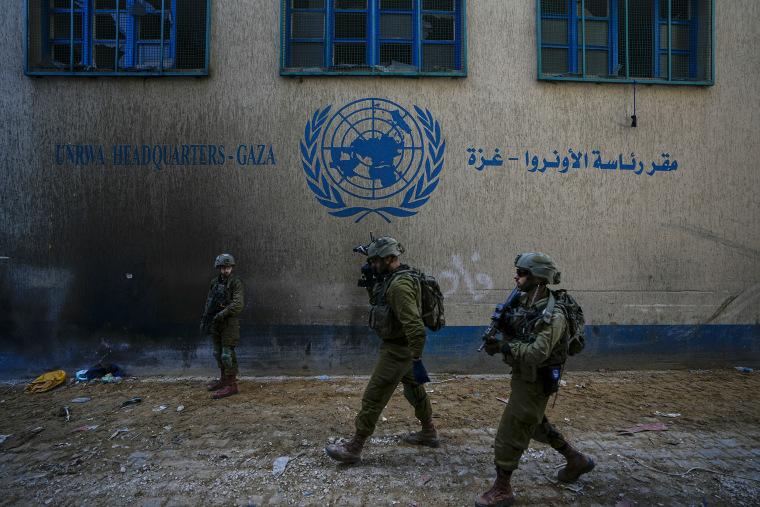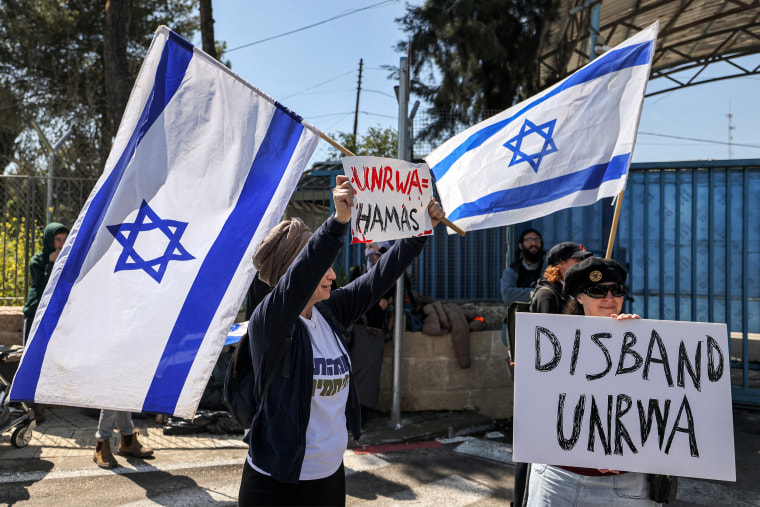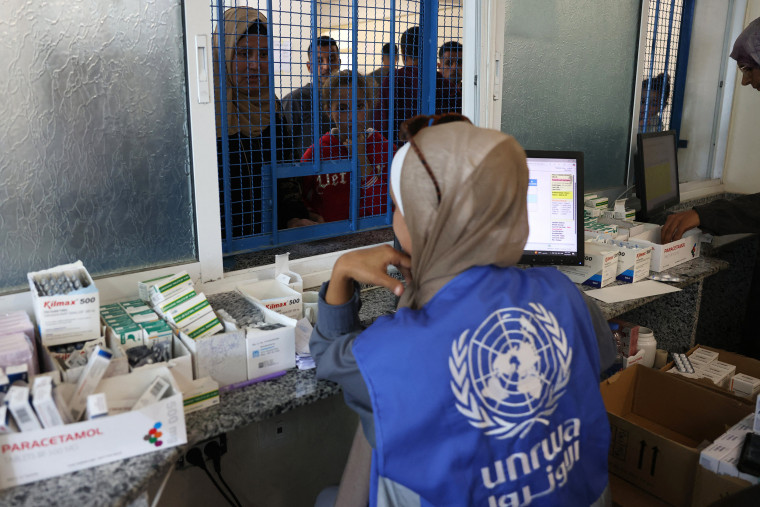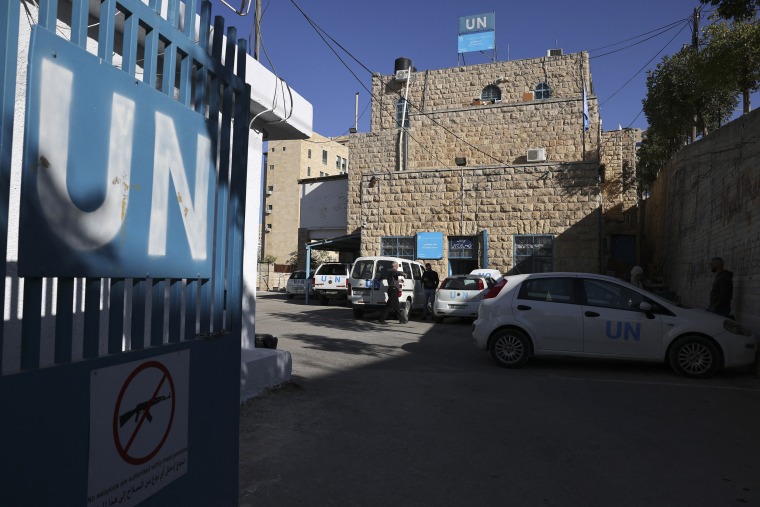Why Israel’s UNWRA ban could be devastating for Palestinians
UNRWA provides far more than humanitarian aid in the Gaza Strip. In this impoverished enclave, the United Nations agency for Palestinian refugees acts almost like a state, providing essential services such as health care, education and even psychological support.
That’s why there was an outburst of dismay from Palestinians, countries around the world and aid organizations when Israel’s parliament voted to outlaw any contact between itself and UNRWA — a move that will severely hamper the embattled humanitarian agency.
Israel says the organization has been infiltrated by Hamas “widely and deeply,” accusing its staffers of taking part in the Oct. 7 terror attack in which 1,200 people died and another 250 were kidnapped. In response, UNRWA fired at least 10 people.
Much of the rest of the world says that while it is not perfect, UNRWA is the only thing standing between the humanitarian disaster playing out in Gaza and a fate somehow more hellish.
In Gaza, “the humanitarian community as a whole is performing the functions of the state,” said Scott Paul, director of peace and security at the anti-poverty charity Oxfam America. “UNRWA is by far the central actor in that apparatus. And pulling the rug out from UNRWA is essentially pulling the rug out from under people’s most basic needs.”

The upshot of UNRWA not being able to work “is that in the Gaza Strip, where more than 2.2 million people are barely hanging on — and many of them are already dying — their support system goes away,” he said.
Many Palestinians see darker motives, viewing the UNRWA ban as Israel’s latest attempt to make their lives unlivable, first imprisoning and bombing them, now taking away their main aid lifeline.
“The impact on the ground will be horrible,” Mustafa Barghouti, head of the Palestinian National Initiative political party, told NBC News.
Some believe the move would endanger Palestinians’ refugee status — and with it any hope of returning to the homes inside Israel that they fled during the 1948 “Nakba.”
That conflict led to UNRWA’s establishment in 1949, aiming to provide aid to the 700,000 Palestinian refugees displaced by it. Today, the agency’s mandate is vast, also supporting Palestinian refugees in Jordan, Syria and Lebanon — most of them the children, grandchildren and, in some cases, great-grandchildren of the people who fled what is now Israel.
UNRWA is a unique organization within the U.N., something that has been seized on by Israel and its supporters. According to them, not only does it focus exclusively on Palestinian refugees, as opposed to the United Nations Refugee Agency, UNHCR, but its mandate also does not have an end date. According to its critics, as a powerful force in maintaining a distinct Palestinian identity across the countries in which it operates, it reinforces a refugee status instead of promoting integration and resettlement.
Before the war, UNRWA says it ran almost 400 schools in Gaza and the occupied West Bank, educating some 350,000 children and employing 12,000 staff. In Gaza, these are now shuttered, the buildings becoming makeshift bomb shelters and the staff taking up other roles such as shelter managers or aid distributors, UNRWA says.

Despite many medical facilities being damaged or destroyed by Israeli strikes, around half of UNRWA’s 22 health care sites are still open, it says. And most of its 1,500 health workers are still active in their roles such as doctors, nurses and pharmacists.
Almost all of the enclave’s 2 million population have been displaced at least once; 60% of buildings are damaged or destroyed, the U.N. says. On top of the 43,000 people killed, some 17,000 of them children, another 95,000 are wounded, according to local officials.
UNRWA says it has still managed to provided flour, rice, chickpeas, cheese, hummus and canned fish to more than 1 million people in Gaza. It has rehabilitated and maintained eight wells, providing water to 600,000 displaced people, and collected 6,000 tons of solid waste, it says.
All the while, the war has killed at least 237 of its own staff, it says.
This aid is far from sufficient — the risk of famine looms. Yet, without UNRWA, the situation would be far more dire than it is, humanitarian workers and countries around the globe agree.

If UNRWA disappeared, then “you will see civilians — including children, including babies — not be able to get access to food and water and medicine that they need to live,” State Department spokesman Matthew Miller told a briefing Monday. “We find that, frankly, unacceptable.”
The Israeli laws, which earned global condemnation, were called “totally wrong” by British Foreign Secretary David Lammy, and criticized in a joint statement by Ireland, Norway, Slovenia and Spain.
Despite its endorsements, the United States is yet to resume funding to UNRWA after Israel’s Oct. 7 allegations. All of the other dozen-plus nations that paused have since continued.
The U.S. was UNRWA’s biggest donor. Now, the agency says it faces an $80 million annual shortfall.
Israel meanwhile is deeply critical of the U.N. as a whole.
The pro-Israel monitoring group U.N. Watch says that the General Assembly condemned Israel 14 times last year — compared with seven for the rest of the world, including the likes of North Korea.
Israel claims that more than 100 Hamas operatives are employed by UNRWA, and that the agency has deepening ties with the militant group that seized power in Gaza in 2007.

It alleges that UNRWA hospitals and schools are used as militant positions and it has accused UNRWA classrooms of using antisemitic textbooks that demonize Israel and promote radicalism.
“The Hamas terrorist organization has infiltrated UNRWA in Gaza widely and deeply,” Israeli Foreign Ministry spokesperson Oren Marmorstein told NBC News. “It is not just a few rotten apples,” he added. “UNRWA in Gaza is a rotten tree entirely infected with terrorist operatives.”
UNRWA has issued a point-by-point response to these allegations, pointing out that just 0.2% of its 30,000 staff have been investigated for ties to Hamas, and that it has publicly protested against the use of its premises by Palestinian militants — and the Israeli army.
U.N. Secretary-General António Guterres commissioned an investigation into UNRWA, which found in April that it needed to do more “to implement a zero-tolerance policy,” for example, on instances of antisemitic textbooks being used in its schools.
The laws passed by Israel’s parliament, the Knesset, on Monday banned any UNRWA operations on its soil or contact between the agency and Israeli officials. Coming into effect in three months, it will likely make it impossible for UNRWA to use its current headquarters in east Jerusalem, severely impeding — if not preventing — its work in Gaza and the West Bank, access to which is largely controlled by Israel.
The Israeli Foreign Ministry has said it will use other agencies, such as the World Food Programme and the World Health Organization, to distribute aid. For many, including the U.S., that is not realistic.
“UNRWA has helped ensure Gaza’s survival until now, sustaining hopes for a political solution,” UNRWA head Philippe Lazzarini wrote to the General Assembly on Tuesday. “My staff has given far more than we have the right to ask of them.”





